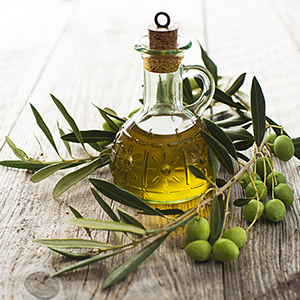Mediterranean Diet

Heart Health
Keep your ticker in top shape by following the tenets of the Mediterranean diet.
Enjoy a Mediterranean Style Diet

A gold standard eating plan
The Mediterranean diet is universally recognized as the “gold standard” eating pattern for promoting good health. The original diet is based on the dietary traditions of Greece and Italy from the 1960s, when these areas were first identified as having low rates of heart disease, and high life expectancy. Studies have linked it to a reduce risk of developing heart disease, diabetes, dementia and certain types of cancer.
Plant-based approach
The cuisine of the Mediterranean emphasizes vegetables, fruit, whole grains, olive oil, legumes, nuts, seeds, fish and seafood, and leaves room for some poultry, eggs and dairy. It’s limited in meats and sweets. This plant-based approach has been well-studied by nutrition researchers, and has been shown as a good combination of foods to combat heart disease.
It's simple
The Mediterranean diet is a throwback to a simpler time, when staples were mainly of fruits and vegetables, beans and nuts, healthy grains, fish, olive oil, small amounts of dairy, and red wine. The healthfulness of the Mediterranean diet has been corroborated by more than 50 years of nutrition research.
If you are looking for a healthy diet plan that can combat many chronic diseases, but still fill your plate with sumptuous cuisine, the Mediterranean diet may be right for you.
Use olive oil as the principal fat
With its high percentage of heart-healthy monounsaturated fat, olive oil is the main fat in the Mediterranean diet. It should be used to replace other fats and oils, including butter and margarine. It’s the right fat for heart health.

Add flavour with herbs and spices

As a key component to the Mediterranean diet, herbs and spices are used liberally to flavour foods, and reduce the reliance on salt or fat when cooking. Bonus: Herbs and spices are rich in health-promoting antioxidants. The herbs and spices common to the traditional Mediterranean Diet include: anise, basil, chilies, cloves, cumin, fennel, garlic, marjoram, mint, oregano, parsley, rosemary, sage, savory, sumac, tarragon and thyme. Using herbs instead of salt can help lower blood pressure levels and reduce heart disease risk.
Eat more nuts
Enjoy a small handful of nuts—about ¼ cup—a few times a week, if not daily. This addition of nuts to the diet can reduce heart disease risk by 25 percent. Try pecans, walnuts, almonds, cashews, hazelnuts, brazil nuts or any combination of these crunchy, delicious bites.

Protein choices in the Mediterranean diet

The main protein sources in the Mediterranean diet are legumes, nuts, seeds and fish. But, there is still room for more traditional protein-rich foods, such as poultry, eggs, cheese and meat—they are just a secondary choice to the plant-based options. Nuts, seeds and legumes are the best choices for heart health; their fibre content is good for managing cholesterol levels.
Here’s how animal-based protein fits into the Mediterranean diet:

- Fish and seafood: a staple of the fabled Mediterranean shores, fish and seafood can be eaten often, and should be included at least twice a week.
- Dairy foods, such as milk, cheese and yogurt, fall into the “moderate portions, daily or weekly” category. In some cases, lower-fat versions of dairy products should be chosen—as with full-fat cheese like Brie.
- Poultry and eggs: These also fall into the “moderate portions, daily or weekly” category. Eggs should be limited to no more than 7 per week, including those used in cooking and baking.
- Red meat can be enjoyed a few times per month. When red meat is eaten, studies suggest that portions should be small – a maximum of 12 to 16 ounces per month is advised. Lean versions and trimmed meats are also advised.
The Mediterranean diet includes wine

Wine is consumed regularly but moderately in the Mediterranean— but what is moderate consumption? It’s usually defined as no more than one five-ounce glass of wine per day for women, and up to two five-ounce glasses for men. If you don’t drink wine, don’t start for this diet. It’s fine without the wine! If you do enjoy wine, remember the rule of moderation. In moderate amounts, red wine may boost “good” cholesterol levels.
Enjoy fruit for dessert
Since sweets and pastries are discouraged in the Mediterranean diet, fruit is the perfect dessert. Fruits common to the traditional Mediterranean Diet include: apples, apricots, avocados, cherries, dates, figs, grapefruits, grapes, melons, nectarines, oranges, peaches, pears, pomegranates and strawberries.

Seared common sea bass on chickpeas roasted in olive oil

This winning recipe has a combination of Mediterranean diet staples: olive oil, herbs, spices, chickpeas and fish. Add vegetables for a perfect, well-rounded meal.
Swap sea bass for salmon or trout
To add an additional layer of heart-health, use a fish that’s rich in omega-3 fat, such as salmon or trout.
See the recipe for Seared common sea bass on chickpeas roasted in olive oil
Add some green vegetables
A quick sauté of baby spinach or kale in garlic and olive oil is the perfect accompaniment for this fish and chickpea dish.

Healthy Bite
Being physically active is also part of the Mediterranean diet! And drink water after you exercise—the beverage of choice in in the Mediterranean diet is water. Following a Mediterranean-style diet can help reduce inflammation, which is a risk factor for heart attack, stroke and Alzheimer’s disease.















